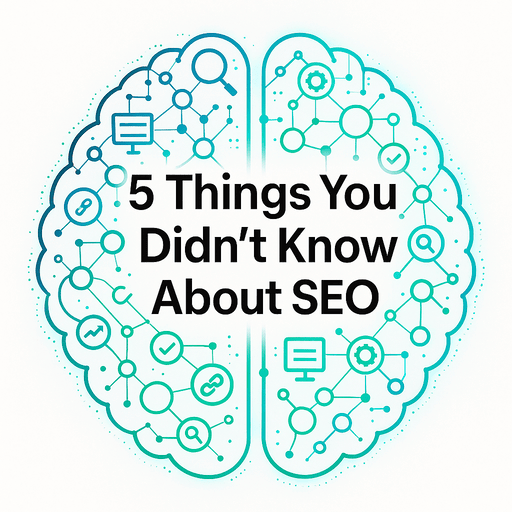5 Things You Didn’t Know About SEO

Short Answer: Even professional SEOs are missing a quiet shift. Search isn’t just about keywords or links anymore. From intent clarity to unlinked mentions, Google and AI systems now rank based on meaning, context, and factual credibility across the entire web.
1. Keyword Cannibalization Can Be Intent Confusion
You’re not being penalized for targeting the same keyword. You’re confusing Google with mixed intent. Modern algorithms group pages by semantic intent, not just matching terms. When two pages answer the same question or serve the same purpose, Google doesn’t know which to rank.
Fix it: Assign each page a unique search intent (informational, transactional, or navigational) and internally link them in a way that clarifies hierarchy. A how-to guide can link upward to a conversion page for the same topic, forming a clean intent chain.
2. Answer Density Now Matters More Than Keyword Density
You can rank without repeating keywords, but not without delivering unique, verifiable answers. AI-driven ranking systems measure how many distinct facts, claims, and subtopics your content covers. A page that answers five related questions now outperforms one that repeats the main keyword twenty times.
Instead of focusing on keyword repetition, build content depth. My article on Answer Density vs Keyword Density explains why the number of verifiable answers per page now outweighs keyword frequency for both Google and AI Overviews.
3. Brand Mentions Without Links Still Build Authority
Google, Bing, and AI models understand semantic brand references even without hyperlinks. These “implied links” feed into entity authority graphs, reinforcing your expertise and credibility. Mentions in press releases, podcasts, and unlinked citations across forums still contribute to your ranking ecosystem.
To strengthen these associations, ensure your brand aligns with identifiable entities. You can learn how entity connections feed visibility in How to Optimize for the Google Knowledge Graph.
4. Internal Link Context Can Outweigh Anchor Text
Anchor text used to be the entire story. Not anymore. Search systems now parse the full sentence and paragraph around your internal link to infer topical relationships. A natural anchor inside a descriptive sentence is more powerful than a forced exact match.
For example, “Learn how to optimize your AI SEO strategy with structured data” carries more semantic value than “click here for AI SEO.” When your link context supports the surrounding content, Google better understands which entities connect, improving both relevance and crawl clarity.
5. Generative Models Remember Content You’ve Deleted
Deleting a page doesn’t erase it from the AI web. Language models and knowledge graphs are trained on snapshots, meaning your old content can continue influencing how AI tools describe your brand or topic. The best way to override it isn’t deletion, but publishing newer, higher-authority replacements that redefine your narrative.
As I discussed in How to Optimize Content for AI Fact Coverage, ensuring every update adds verifiable, source-supported information helps AI systems prioritize your latest version instead of outdated context.
Conclusion: SEO Is Becoming Context Optimization
Today’s SEO isn’t just about what’s on the page. It’s about how your content connects, how it’s cited, and how AI systems interpret it long after publication. The next generation of search visibility belongs to brands that optimize for intent, answers, and continuity, not just rankings.
Want help optimizing your site for AI-driven visibility? Contact me for strategy and content that gets cited, not just indexed.

0 Comments Add a Comment?